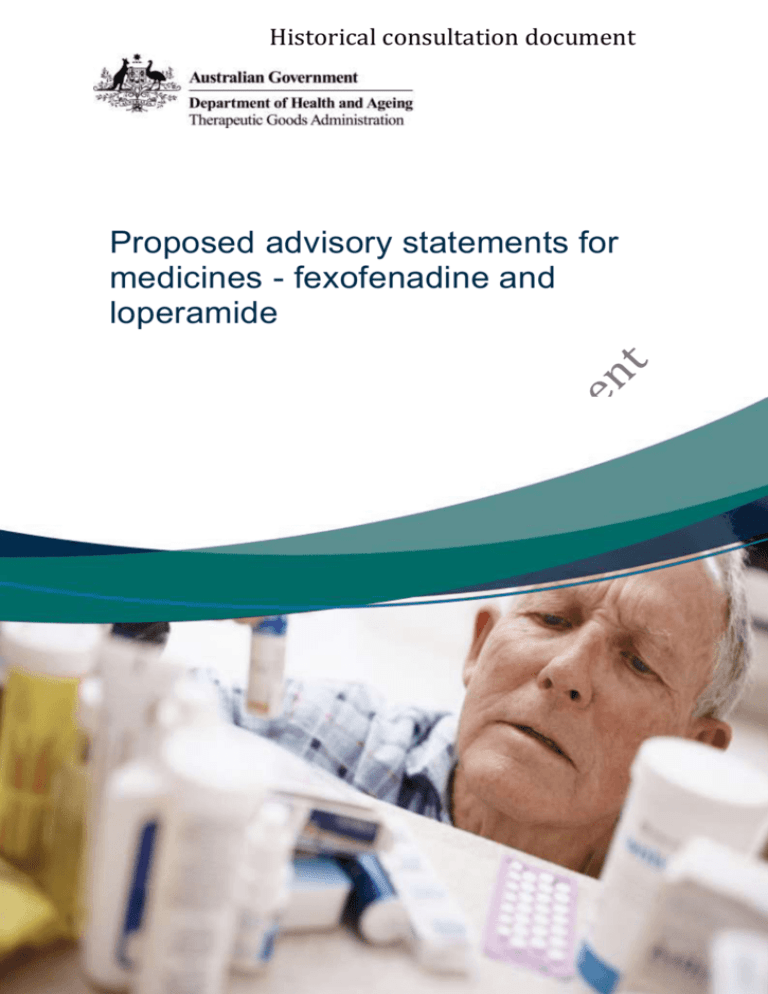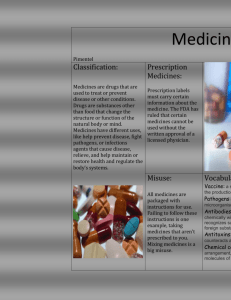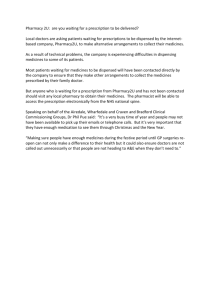
Historical consultation document
Proposed advisory statements for
medicines - fexofenadine and
loperamide
Therapeutic Goods Administration
About the Therapeutic Goods Administration (TGA)
The TGA is a division of the Australian Government Department of Health and Ageing, and is
responsible for regulating medicines and medical devices.
TGA administers the Therapeutic Goods Act 1989 (the Act), applying a risk management
approach designed to ensure therapeutic goods supplied in Australia meet acceptable standards
of quality, safety and efficacy (performance), when necessary.
The work of the TGA is based on applying scientific and clinical expertise to decision-making, to
ensure that the benefits to consumers outweigh any risks associated with the use of medicines
and medical devices.
The TGA relies on the public, healthcare professionals and industry to report problems with
medicines or medical devices. TGA investigates reports received by it to determine any
necessary regulatory action.
To report a problem with a medicine or medical device, please see the information on the TGA
website.
Copyright
© Commonwealth of Australia 2012
This work is copyright. You may reproduce the whole or part of this work in unaltered form for your own personal
use or, if you are part of an organisation, for internal use within your organisation, but only if you or your
organisation do not use the reproduction for any commercial purpose and retain this copyright notice and all
disclaimer notices as part of that reproduction. Apart from rights to use as permitted by the Copyright Act 1968 or
allowed by this copyright notice, all other rights are reserved and you are not allowed to reproduce the whole or any
part of this work in any way (electronic or otherwise) without first being given specific written permission from the
Commonwealth to do so. Requests and inquiries concerning reproduction and rights are to be sent to the TGA
Copyright Officer, Therapeutic Goods Administration, PO Box 100, Woden ACT 2606 or emailed to
<tga.copyright@tga.gov.au>.
Propose advisory statement for medicines – fexofenadine and loperamide
Page i
Therapeutic Goods Administration
Contents
Proposed advisory statements for medicines – fexofenadine and
loperamide ___________________________________________________________________ 2
Invitation to comment ___________________________________________________________________ 2
Timetable _________________________________________________________________________________ 2
Content of submissions __________________________________________________________________ 2
How to respond __________________________________________________________________________ 2
What will happen ________________________________________________________________________ 3
Confidentiality ___________________________________________________________________________ 3
Background ______________________________________________________________________________ 4
Summary of proposed changes ____________________________________________ 6
Section 1 – Medicines to which advisory statements apply____________ 6
Section 2 – Advisory statements ___________________________________________ 6
Propose advisory statement for medicines – fexofenadine and loperamide
Page 1 of 8
Therapeutic Goods Administration
Proposed advisory statements for medicines –
fexofenadine and loperamide
Invitation to comment
The TGA is seeking comments from interested parties on the proposed advisory statements for
fexofenadine and loperamide for inclusion in the RASML document when it is next updated.
The proposed advisory statements for fexofenadine and loperamide would be required on the
‘label’ of non prescription products containing these two ingredients. Advisory statements on the
label of medicines assist in the quality use of medicines by consumers.
Through the consultation process, the TGA is requesting feedback that will help ensure that the
proposed advisory statements are considered appropriate and supports the quality use of
medicines for non-prescription products containing fexofenadine or loperamide.
Note: ‘Label’ means a display of printed information upon, or securely affixed to, the container and any primary
pack containing the goods.
Timetable
Document released for consultation on 4th May 2012.
Interested parties should respond by close of business 4th June 2012.
Feedback will be released following consideration of submissions (see 'What will happen').
Content of submissions
Submissions may address any, or all, of the proposed advisory statements and other identified
issues.
In addition, submissions might include:
Whether or not you support the wording of the advisory statement. If you do not support the
wording of the statement you may make suggestions for an alternative acceptable to you.
An assessment of how the proposed change will impact on you. That is, what do you see as the
likely benefits or costs to you (these may be financial or non-financial). If possible, please
attempt to quantify these costs and benefits.
How to respond
All submissions should be accompanied by a TGA submission coversheet. Submissions must include
full personal or organizational contact details (including address, telephone number and email).
Electronic submissions are preferred and should be emailed to otc.medicines@tga.gov.au. Please
include ‘Proposed advisory statement – fexofenadine and loperamide’ in the subject line of the
email
Alternatively, hard copy submissions may be mailed to:
OTC Medicines Evaluation
Office of Medicines Authorisation
Therapeutic Goods Administration
PO Box 100
WODEN ACT 2606
Propose advisory statement for medicines – fexofenadine and loperamide
Page 2 of 8
Therapeutic Goods Administration
What will happen
Submissions will be reviewed by the TGA and feedback on submissions will be provided through
the TGA's Internet site. Recommendations made by the TGA following consideration of submissions
from interested parties will be published on the TGA website.
The proposed advisory statements will then be included in the next update of the RASML
document.
Confidentiality
All submissions will be placed on the TGA's website unless marked confidential. Any confidential
material contained within your submission should be provided under a separate cover and clearly
marked 'IN CONFIDENCE'. Reasons for a claim to confidentiality must be included in the space
provided on the TGA submission coversheet.
For submissions made by individuals, all personal details other than your name will be removed
from your submission before it is published on the TGA's website.
The RASML Edition 1 including update 4 (dated September 2008) remains the current
version which sponsors should continue to refer to.
Propose advisory statement for medicines – fexofenadine and loperamide
Page 3 of 8
Therapeutic Goods Administration
Background
In order that medicines are used safely and effectively, consumers rely on accessing information
about their medicines from their health practitioner, pharmacist and medicine ‘label’. Generally for
non prescription medicines, also known as over-the-counter (OTC) medicines, the label of the
product contains information on appropriate directions for use. In addition advisory statements
may also be included on the labels of these OTC products to facilitate the quality use of medicines
by consumers.
The Standard Uniform Scheduling of Medicines and Poisons (SUSMP) sets out the level of control on
the availability of medicines and poisons in Australia. The following classification relates to
medicines.
Schedule 2 – Pharmacy Medicine (available without a prescription from pharmacies)
Schedule 3 – Pharmacist Only Medicine (available without a prescription from a pharmacist in a
pharmacy)
Schedule 4 – Prescription Only Medicine (available from a pharmacist on prescription)
The decision to change the scheduling of fexofenadine and loperamide in the SUMSP, hence
reducing the level of control by making the medicine more widely available for self selection by
consumers; means that there is a need to ensure that appropriate advisory statements are included
on the labelling of these medicines to enable consumers to self select and use these medicines
safely and effectively.
Note: ‘Label’ means a display of printed information upon, or securely affixed to, the container and any primary
pack containing the goods.
Fexofenadine
In June 2011, a change was made to the scheduling of medicines containing fexofenadine in the
Standard for the Uniform Scheduling of Medicines and Poisons (SUSMP). The scheduling delegate
confirmed a decision to exempt fexofenadine from scheduling when intended for short-term
symptomatic relief of seasonal allergic rhinitis in adults and children 12 years of age and over,
when sold in small packs of 10 dosage units or less (i.e. not more than 5 days’ supply at the current
maximum recommended dose) with a maximum daily dose of 120mg. The decision to exempt
fexofenadine from scheduling means that fexofenadine will be available to consumers from
pharmacies as well as retail stores other than a pharmacy (i.e. supermarkets. local corner stores,
petrol station or newsagencies).
Note: In September 2011, the delegate decided to editorially amend the Schedule 2 and 4 fexofenadine entries in
the Standard Uniform Scheduling of Medicines and Poisons (SUSMP) to specifically stipulate a limit of 5 days’ supply
in the exemption.
In making the decision to “down schedule” fexofenadine from Schedule 2 (Pharmacy medicine) to
unscheduled, hence increasing the access to consumers, the scheduling delegate affirmed the
recommendation made by the Advisory Committee on Medicines Scheduling (ACMS) that the
requested exemption from scheduling was acceptable. The delegate also decided to recommend to
the appropriate areas of the TGA for consideration of a requirement for a labelling warning
statement in the Required Advisory Statements for Medicine Labels (RASML) for exempt
preparations of fexofenadine to the following effect:
“This product should not be used when pregnant or breastfeeding except when advised by your
doctor or pharmacist. Do not use with other antihistamines”
Proposed advisory statement
Following advice from the Advisory Committee on Non prescription Medicines (ACNM), the TGA
proposes the following advisory statement for fexofenadine when supplied as a non-prescription
medicine [i.e. an over-the-counter (OTC) medicine];
Propose advisory statement for medicines – fexofenadine and loperamide
Page 4 of 8
Therapeutic Goods Administration
Do not use during pregnancy or breastfeeding unless advised by your doctor or pharmacist
(statement no. xx in proposed update 6 of RASML)
Loperamide
In September 2011, a change was made to the scheduling of medicines containing loperamide in the
Standard for the Uniform Scheduling of Medicines and Poisons (SUSMP). The scheduling delegate
confirmed a decision to exempt loperamide from scheduling when in divided oral preparations
containing 2mg or less of loperamide per dosage unit, in a primary pack containing 8 dosage units
or less. The decision to exempt loperamide from scheduling means that loperamide will be
available to consumers from pharmacies as well as retail stores other than a pharmacy (i.e.
supermarkets. local corner stores, petrol station or newsagencies)
In making the decision to “down schedule” loperamide from Schedule 2 (Pharmacy medicine) to
unscheduled, the scheduling delegate confirmed the recommendations made by the ACMS that the
requested exemption from scheduling was acceptable. The delegate also agreed to communicate
the evaluator’s labelling recommendations to the appropriate areas of the TGA for consideration.
Current requirement
In the current RASML document dated September 2008, Loperamide when included in a Schedule
to the Standard Uniform Scheduling of Medicines and Poisons (SUSMP) requires
Do not give to children under 12 years of age (statement no. 6)
Do not use beyond 48 hours or in pregnancy or lactation except on doctor’s advice (statement
no. 17)
Proposed advisory statements
The TGA has proposed, in response to stakeholders submission to the public consultation on
RASML updates 5 & 6, that the RASML require the labels of Schedule 2 loperamide products to
include warnings consistent with the following:
Do not give to children under 12 years of age (statement no. 6)
If the condition persists after two days of treatment, seek medical advice as soon as possible
(statement no. 180 in proposed update 5 of RASML)
Do not use during pregnancy or breastfeeding unless advised by your doctor or pharmacist
(statement no. xx in proposed update 6 of RASML)
Following advice from the ACNM, the TGA proposes the following advisory statements for
loperamide when supplied as a non-prescription medicine [i.e. an over-the-counter (OTC)
medicine]:
Do not give to children under 12 years of age. (statement no. 6 in RASML September 2008)
If the [condition] persists after two days of treatment, seek medical advice as soon as possible.
(statement no. 180 in proposed update 5 of RASML)
Do not use during pregnancy or breastfeeding unless advised by your doctor or pharmacist.
(statement no. xx in proposed update 6 of RASML)
If you get an allergic reaction stop taking and see your doctor immediately. (statement no. 159
in RASML September 2008)
Drink plenty of water (statement no. 184 in proposed update 5 of RASML )
See your doctor or pharmacist before taking [this product/product name] if you have a fever,
severe stomach pain, bloody diarrhoea or ongoing medical condition affecting the bowel.
Do not take if you suffer a medical condition where constipation should be avoided.
Propose advisory statement for medicines – fexofenadine and loperamide
Page 5 of 8
Therapeutic Goods Administration
Summary of proposed changes
Substance
Change type
Fexofenadine
New entry
Loperamide
Amendment to existing entry
Details of the proposed changes are shown in the tables below. These tables show:
the existing entry# which requires amendment or inclusion of additional information (showing
proposed amendment in red and underlined and the deletions, if any, in black strikethrough); or
the proposed new entry (inserted details in red and underlined);
#As
per RASML Edition 1 including update 4 (dated September 2008)
Section 1 – Medicines to which advisory statements
apply
1. Amendment to existing entry
Medicines Containing …
Which Meet The Following Conditions ...
Required
Statement(s)
Loperamide
(a) When included in SUSDP SUSMP Schedule 2; or
(b) When excluded from the Schedules to the SUSMP.
(6, 17 159, 180#,
184#, xx^, A, B)j
#Statement as proposed for update for RASML 5
^Statement as proposed in response to submissions to the consultation for update 6, therefore no
number has been allocated.
2. New entry
Medicines Containing Which Meet The Following Conditions .
Fexofenadine
(a) When included in SUSMP Schedule 2; or
(b) When excluded from the Schedules to the SUSMP.
Required
Statement(s)
xx^,
^Statement as proposed in response to submissions to the consultation for update 6, therefore no
number has been allocated.
Section 2 – Advisory statements
1. Added new advisory statements
No
Statement Text
180#
If the [condition] persists after two days of treatment, seek medical advice as soon as possible.
184#
Drink plenty of water
Propose advisory statement for medicines – fexofenadine and loperamide
Page 6 of 8
Therapeutic Goods Administration
No
Statement Text
xx^
If you are pregnant or breastfeeding, check with your doctor or pharmacist before using this
medicine.
A*
See your doctor or pharmacist before taking [this product/product name] if you have a fever, severe
stomach pain, bloody diarrhoea or ongoing affecting the bowel
B*
Do not take if you suffer a medical condition where constipation should be avoided
#Statement as proposed for update for RASML 5.
^Statement as proposed in response to submissions to the consultation for update 6, therefore no
number has been allocated.
*A number will be allocated in the RASML document at the time of updating to ensure consistency
with the numbering system.
Propose advisory statement for medicines – fexofenadine and loperamide
Page 7 of 8
Therapeutic Goods Administration
PO Box 100 Woden ACT 2606 Australia
Email: info@tga.gov.au Phone: 1800 020 653 Fax: 02 6232 8605
www.tga.gov.au




